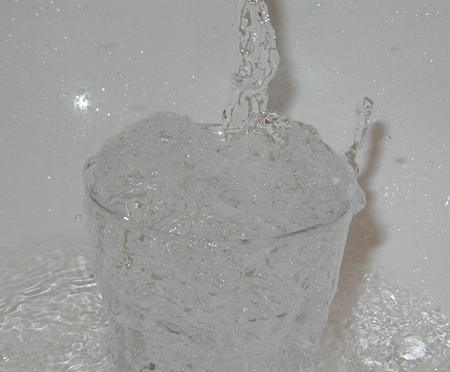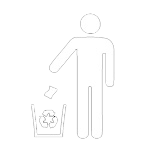Water constitutes 50-60% of an average persons body weight and is vital for life. When fully hydrated, physical and mental performance is optimal, but even relatively small fluid losses can dramatically impair your ability to mountain bike efficiently. Physical performance is reduced by 5% for every 1% loss of body fluid. This means that if you loose 5% of your body weight through sweating, you should expect a 30% drop in physical performance. A fluid loss of as much as 9-12% can be fatal.
How does fluid loss effect performance?
· The main constituent of blood plasma is water, which is the body’s internal transport mechanism. Red blood cells and nutrients are carried in this aqueous solution to different parts of the body delivering the fuel for physical exercise. In addition to red blood cells and nutrients, carbon dioxide and other metabolic wastes are carried by the blood plasma to be removed from the body, and the hormones that regulate metabolism use this same transport system to reach their required destinations. Dehydration thickens the blood by removing water from this fluid cocktail, causing the bloods constituents to become less diluted, which leads to reduced cardiovascular function.
· Water also helps dissipate the heat generated during exercise, through the sweat mechanism. Although water is lost from the body by other means, heavy sweating along with insufficient fluid consumption represents the primary cause of dehydration in endurance athletes. The act of sweating helps to prevent overheating and it is only when we become dehydrated, that this luxury is sacrificed in order to maintain the blood profile, discussed previously. This competition for water leads to reduced cooling, overheating and the associated reduction in physical performance.
· Studies have shown that mental performance is affected when the body is in a dehydrated state. Research indicates that reaction time increases (slows down) when dehydrated, a serious handicap for the Mountain Biker, as important decisions often need to be made in a split second.
How do I maximise my fluid intake?
· Do not rely on your thirst to let you know when you need to drink. By the time you are thirsty, it is often too late to affect your hydration levels, especially if you are planning to ride your bike for a long period of time.
· The rate at which your stomach releases fluid into your duodenum (small intestine) depends upon the volume of fluid present. Large volumes trigger neural receptors in the stomach and duodenum to increase the rate of gastric emptying. The implications of this are that sipping regularly from a camelback is not likely to be as effective a form of re-hydration as less regular, large gulps from a bottle. Gulping has been the preferred method for Mountain Bike racers for some time, because there are usually a couple of points on each lap where drinking is possible and the philosophy is indisputably, get what you can while you can.
· The type of fluid you consume also effects the rate of gastric emptying. Strong carbohydrate solutions empty more slowly than weaker ones, which also empty more quickly than water. If you are using a commercially available sports drink, don’t make the mix more concentrated than is suggested by the manufacturer; the performance loss through dehydration could easily out-weigh the benefit of the extra carbohydrate. If you usually drink plain water, you will re-hydrate more quickly if you mix up a sports drink to the recommended concentrations (usually 100g carbs per 750ml water).
· Although our need to replace lost body fluid far outweighs our need for electrolytes (salts), a pinch of salt into plain water, or into your neutral sports drink will speed up gastric emptying and subsequent absorption. It will also go some way towards replacing some of the salt lost through sweating. Many sports drinks already contain electrolytes and most of us have an abundance of salt in our diets, so don’t over do it.
As a general guide, make a conscious effort to consume plenty of any fluid that does not contain caffeine or alcohol as these are diuretics (cause regular visits to the little persons room), which encourage your body to dehydrate. If you ride your bike infrequently, stick to water, and if you cycle every day, alternate water with a sports drink mix. Non-diet soft drinks are OK, but simple sugars play havoc with your blood glucose levels, so you may find yourself falling asleep when you know you shouldn’t. Sports drinks contain complex carbohydrates, which encourage more stable blood glucose concentrations. If you would like to know a bit more about sports drinks and carbohydrates, have a look at the information in the TORQ on-line nutrition shop and I’ll obviously keep you posted with any research developments in this area.







